Everyone Chooses Little Gain

Hessam Emami
Last Monday, former Iranian president Ali Akbar Hashemi Rafsanjani warned that the Guardian Council’s decision to disqualify a large number of candidates could widen a decade-long rift between top officials and went even so far as to question the qualification of the Council’s members. “Where did you get your own qualification from?” he said, in an unprecedented open criticism of the Guardian Council, which soon came under heavy fire from his opponents. The focal point in his remarks was the barring of Hassan Khomeini, a grandson to the founder of the Islamic Revolution Ruhollah Khomeini, from running for a seat in the Assembly of Experts. “At a time when we should all be congratulating each other, they gave a bad gift to the Imam’s household,” he said in reference to the expectations for a more open domestic atmosphere following the implementation of the Joint Comprehensive Plan of Action. Rafsanjani’s comments have been annexed since then by some other top Iranian officials.
Perhaps on a gloomy note came incumbent President Hassan Rouhani’s speech, on Sunday, during the second national conference on “Moderation, Women and Development”. In response to questions about the status quo posed to him ‘in letters, messages and in person’, Rouhani implied that while understanding all the existing problems, he is trying to avoid clamor for the sake of a higher goal. “One can shout or issue statements but what matters and should not be forgotten is the goal,” he stated. Drawing upon his presidential campaign slogan, he defined ‘prudence’ as meaning providence and highlighted the significance of the outcome. “Let’s see the end and know that we can move toward to the ballot boxes through prudence, patience, and mobilizing the public”. What Rouhani demonstrated in his remarks on Sunday is that, at best, he is listening to the questions already in the air but has little executive power to make any improvements in the short term. “We know if we go, we will achieve little gain but we will definitely lose if we do not. We will choose little gain,” he reiterated, in a rather explicit reference to the massive disqualifications that are believed to have induced despair among a large number of voters.
A separate but similar message from former president Mohammad Khatami, who is under strict official media blackout, also emerged circulating in Telegram channels on Monday. The message of the message was clear. “Let’s see the elections as a chance for consolidation and an intro for transition from a skeptical security atmosphere to an open political one for cooperation to serve the country and the Revolution,” reads the message, which follows nearly the same logic as that of Rouhani’s speech. “Experience has proven that, despite cul-de-sacs, the higher the public participation in the elections, the closer will be the outcome to wisdom, reformism and moderation,” said the message, stressing the necessity of a massive turnout for the sake of the country’s security and economy.
Surprisingly, earlier on Sunday, a rumor hit headlines in Iranian media, having ex-president Mahmoud Ahmadinejad, an archenemy to most reformists in Iran, declare death of principlism in the country and predict a victory for the reformist front in the upcoming parliamentary election. Even though Morteza Tamaddon, a former Tehran governor affiliated with Ahmadinejad, immediately dismissed the comments, they did contain some degrees of poetic truth of that perhaps best explain the situation in Iran. “Some are sitting around under the name of principlists, distributing shares among themselves and expecting people to vote in their favor while no more than seven or eight of their nominees will enter the parliament out of their thirty-man shortlist,” Ahmadinejad was quoted as saying. “Even though [almost all prominent] reformists and most serious competitors have been disqualified, these very third-class reformist and pro-administration candidates will thrash the principlists,” Ahmadinejad reportedly told a group of peers. In his supposed criticism of the principlist coalition, Ahmadinejad said the list is devoid of charismatic figures while some of its hopefuls have already failed past tests. Many in Iran do not take Ahmadinejad’s prophecies seriously but this one seems to be a little different, as in the absence of a powerful rival, the principlists’ coalition might turn into a house of cards, even shakier than it was before the presidential race in 2013.

